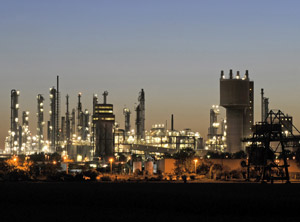BASF
POM to be brought into a jv with Kolon / Ludwigshafen plant will close in H2 2018
 In future BASF will not produce POM at its headquarters in Ludwigshafen (Photo: BASF) |
As it continues to peel back its presence in the European standard thermoplastics market, BASF (Ludwigshafen / Germany; www.basf.com) has announced it will bring its polyoxymethylene (POM) business into a 50:50 joint venture with South Korea’s Kolon Plastics (Seoul; www.kolonplastics.com), Kolon BASF innoPOM, and concentrate its production in Asia. The move appears in line with BASF’s often repeated strategy of locating facilities closer to customers in the Asia-Pacific region and also reflects its gradual withdrawal as a major player in the European standard thermoplastics production sector.
BASF plans to shutter production at Ludwigshafen in the second half of 2018 when the new Korean facility – billed as the world’s largest for POM – starts up at a site owned by Kolon at Gimcheon. The 70,000 t/y capacity of the new plant is relatively small compared with the 300,000 t/y output of Asia-focused market leader Polyplastics (Tokyo / Japan; www.polyplastics.com) but through the jv BASF stands to gain a sharper image as a POM producer on this continent just as the Japanese competitor seeks to enhance its overall presence in Europe – see Plasteurope.com of 20.07.2015.
Plasteurope.com’s Polyglobe capacity database (www.polyglobe.net) shows that Kolon has capacity to produce 60,000 t/y of POM at Gimcheon, while BASF can produce 50,000 t/y at Ludwigshafen. In an unusual move, BASF will not contribute its own technology to the new facility. This will use a proprietary process of the Korean partner, described as “highly efficient” and “best in class.” In a statement, the companies said the “globally leading technology and the efficiencies of the existing infrastructure will generate significant synergies.”
The German-Korean cooperation evidently is intended to be the first step in a longer-term partnership. “We are looking forward to this joint venture that may lead to further opportunities for cooperation,” said Kolon’s CEO Hee Goo Jang. “Kolon and BASF have had an excellent business relationship for many years,” added Raimar Jahn, president of BASF’s Performance Materials division. With the market for POM growing worldwide, he said the new jv, particularly in Asia, “will strengthen our ability to support our customers with high-performing, innovative specialties.”
Polymer produced in the Korean plant will be marketed separately by the two partners under their respective trade names and proprietary formulations. Kolon markets its material under the trade name “Kocetal”, while BASF sells its POM products for a wide range of applications under the trade name “Ultraform.”
BASF plans to shutter production at Ludwigshafen in the second half of 2018 when the new Korean facility – billed as the world’s largest for POM – starts up at a site owned by Kolon at Gimcheon. The 70,000 t/y capacity of the new plant is relatively small compared with the 300,000 t/y output of Asia-focused market leader Polyplastics (Tokyo / Japan; www.polyplastics.com) but through the jv BASF stands to gain a sharper image as a POM producer on this continent just as the Japanese competitor seeks to enhance its overall presence in Europe – see Plasteurope.com of 20.07.2015.
Plasteurope.com’s Polyglobe capacity database (www.polyglobe.net) shows that Kolon has capacity to produce 60,000 t/y of POM at Gimcheon, while BASF can produce 50,000 t/y at Ludwigshafen. In an unusual move, BASF will not contribute its own technology to the new facility. This will use a proprietary process of the Korean partner, described as “highly efficient” and “best in class.” In a statement, the companies said the “globally leading technology and the efficiencies of the existing infrastructure will generate significant synergies.”
The German-Korean cooperation evidently is intended to be the first step in a longer-term partnership. “We are looking forward to this joint venture that may lead to further opportunities for cooperation,” said Kolon’s CEO Hee Goo Jang. “Kolon and BASF have had an excellent business relationship for many years,” added Raimar Jahn, president of BASF’s Performance Materials division. With the market for POM growing worldwide, he said the new jv, particularly in Asia, “will strengthen our ability to support our customers with high-performing, innovative specialties.”
Polymer produced in the Korean plant will be marketed separately by the two partners under their respective trade names and proprietary formulations. Kolon markets its material under the trade name “Kocetal”, while BASF sells its POM products for a wide range of applications under the trade name “Ultraform.”
16.03.2016 Plasteurope.com [233634-0]
Published on 16.03.2016

 German version of this article...
German version of this article...